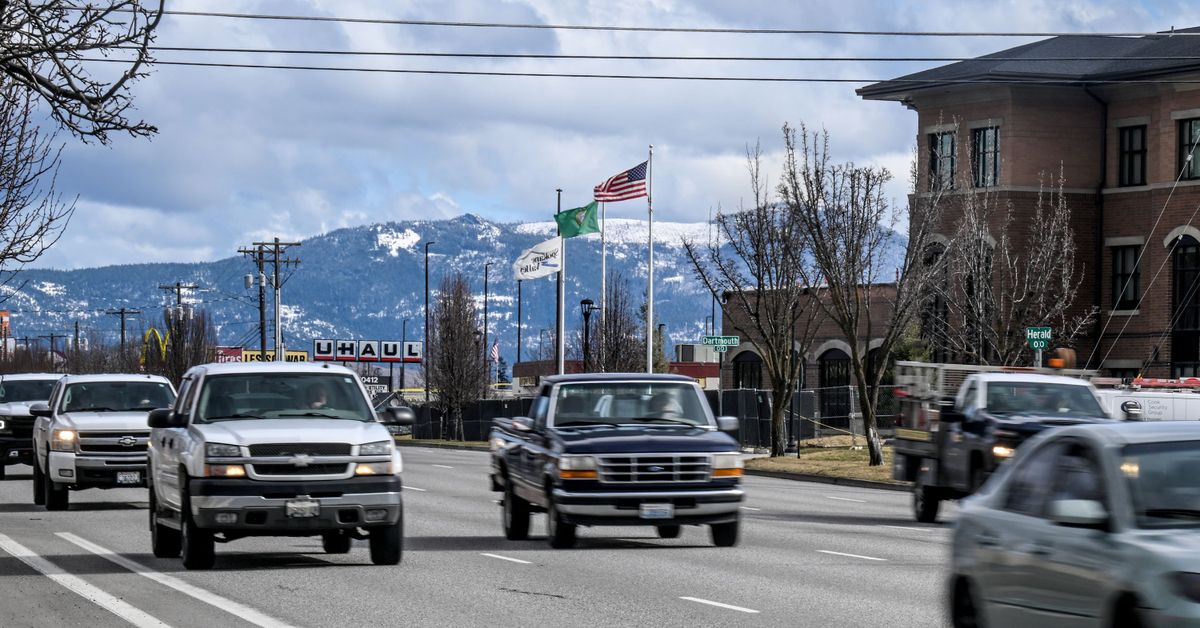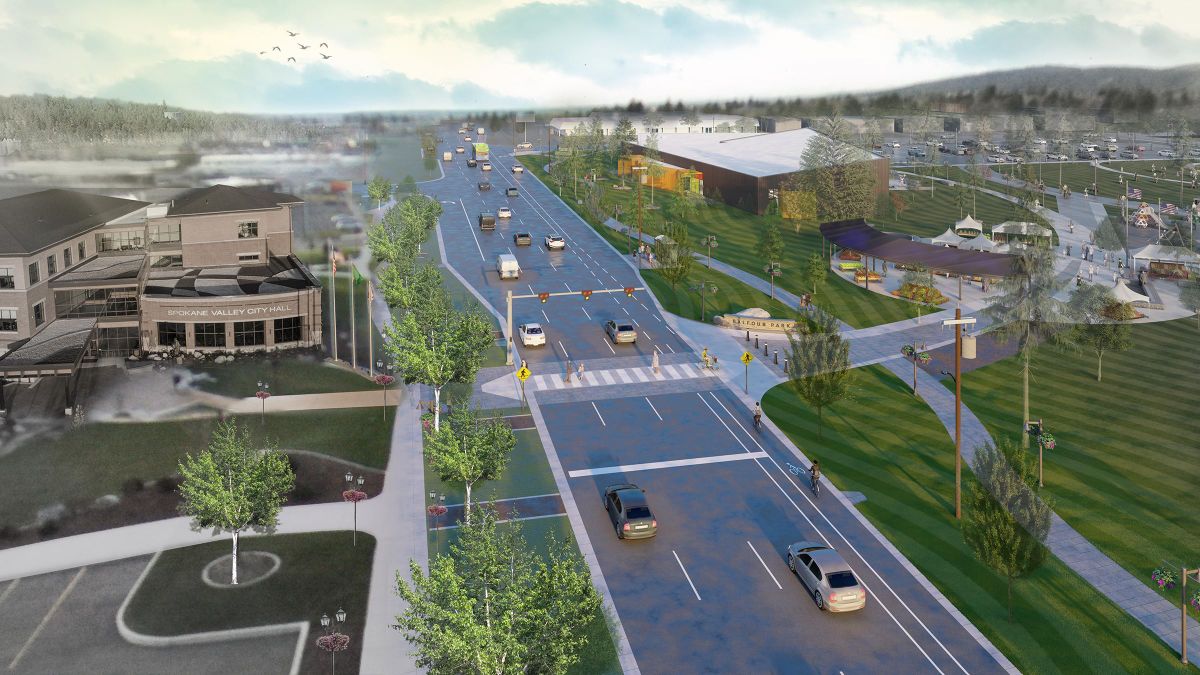Getting There: Sprague Avenue to see biggest transformation in decades
Traffic moves along on Sprague Avenue in front of Spokane Valley City Hall on March 1. As part of the Sprague Avenue Stormwater and Multi-Modal Improvement Project, three blocks of Sprague will be reduced from five lanes to three east of University Road and west to Herald Road. (Kathy Plonka/The Spokesman-Review)
Despite years of debate, land disputes and ballot measures, Sprague Avenue in Spokane Valley has remained relatively the same for decades.
The thoroughfare last saw a transformative change in 2000, when Spokane County turned Sprague into a one-way street and a couplet with nearby Appleway Boulevard. The project was intended to accommodate increasing traffic in the area.
Sprague will see another big change this summer, as the city of Spokane Valley moves forward with plans to reduce a section of the five-lane avenue to three lanes.
The work will remain in a relatively small section of Sprague, a half-mile from University Road to the east to Herald Road to the west. Stormwater treatment swales will be added to both sides where the existing outer lanes are, a new Spokane Transit Authority bus stop will be installed on the north side of Sprague and a signalized crosswalk will connect City Hall to the new Spokane Valley Library and Balfour Park across the street.
Traffic studies conducted by the city over the years show the stretch of Sprague between University and Herald could still handle traffic volumes if it had three lanes instead of five.
Spokane Valley Deputy Mayor Tim Hattenburg said the safety benefits are a large portion of why he supports the project.
Those aforementioned studies found more than 60% of the cars that pass through the section are traveling well above the posted speed limit of 35 mph, with more than 120 drivers exceeding 50 mph on any given day.
“Our police chief said we could put an officer at the corner of University, and they could write tickets all day,” Hattenburg said.
Spokane Valley City Councilwoman Jessica Yaeger agreed that the safety improvements are needed. She was not on the council when the project was approved and was initially skeptical about the work because she thought the project would be more extensive.
She also questioned whether the funding allocated for the project could be reallocated toward the city’s ongoing efforts to hire more deputies for the Spokane Valley Police Department, as did Councilman Al Merkel.
The reduction, stormwater swale construction and installation of the pedestrian crossing and bus stop is expected to cost more than $4.5 million. The city has received more than $610,000 in state grants and a $385,000 grant from the Spokane Transit Authority for the project, and the City Council has allocated more than $1.3 million in federal COVID relief funding towards it. The remaining $2.1 million will be covered by city funds designated for stormwater improvements and pavement preservation.
Yaeger decided to support it after learning the reduction would only be from University to Herald, and because constituents approached her with desires for a more pedestrian -friendly Sprague.
“I do know that families were asking about a crosswalk right there,” Yaeger said. “I do think it is appropriate to get a crosswalk in, and it will beautify the area as well.”
Yaeger believes the project will help draw the community into the area, which has long been touted as the heart of the city.
Revitalization efforts have been ongoing for more than a decade, and the city is in the process of turning the once empty 5-acre lot next to Balfour Park into an expansive recreation area, complete with basketball courts, a splash pad and an outdoor amphitheater for concerts and community gatherings.
“We just built this park, we want to use it, we want it to be an attraction for families,” Yaeger said.
Matt Hedman co-owns 45 Degree Brewhouse in the middle of the proposed reduction area. He said he looks forward to the completion of the expanded Balfour Park and believes the improved pedestrian facilities will tie in well to the larger plans for a true city center.
“If you have five lanes and someone’s trying to sprint across traffic, there is the safety factor,” Hedman said. “I’ve seen innumerable instances of someone trying to dash across there.”
Hedman said he will have to wait to see what the reduction may mean for his business and others in the area. He said foot traffic could be a benefit, but added that he worries traffic may get bottlenecked before Sprague reverts back to five lanes after Herald.
Studies conducted by the city indicate that most businesses in the area support the project, and drivers shared with the city it can be hard to access restaurants and store fronts on a five-lane Sprague.
“I hope it works out well,” Hedman said. “I want to see the businesses succeed and I want it to be pedestrian friendly and be beneficial for the community.”
Merkel, like Yaeger, was not on the council when the project was approved. He thinks the city funds allocated toward the project would be better used to hire more police officers, and has proposed canceling it at recent council meetings.
He said Valley residents have informed him they do not support the project, and he takes umbrage with the name given to the work, Sprague Stormwater and Multi-Modal Improvement Project, because he believes it does not accurately convey what the project entails.
“Calling it the stormwater project makes it seem like, to me, that we have some sort of drainage problem and we’ve got to do this because if we don’t, you know, like the city hall is going to sink,” Merkel said. “It’s just preposterous to call it that.”
The majority of the funding for the project will go towards the construction of the stormwater swales, which will provide better treatment of stormwater than the existing dry wells within the road that leak into the Spokane Valley-Rathdrum Prairie Aquifer, according to the city’s website.
Hattenburg said he agrees with Merkel that hiring more deputies for the Valley is important, but that the funding allocated for the Sprague project is not a viable source to fund more positions. The COVID-relief funding is not a sustainable source for paying deputies’ salaries, and the grant funding must be used for the proposed project.
Hattenburg said the issue is more complicated than just moving funding around. There are several involved parties, including the state’s Department of Ecology, the state’s transportation department, the STA and the city of Spokane Valley.
“To say we can just take money from that project and put it elsewhere, and you can say that about any part of the budget, it’s just not that simple,” Hattenburg said.
Yaeger said she doesn’t believe the current council should be trying to reverse past council actions, as her fellow newly elected council member Merkel suggested.
“I am supportive, and on the other hand, I’m also not there to erase everything and go backward in time,” Yaeger said. “I think we need to use our time and resources appropriately. I think we need to look at what they did last year and try to move forward in the best way possible.”

